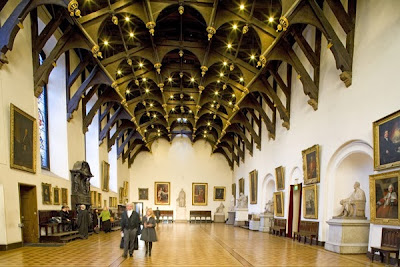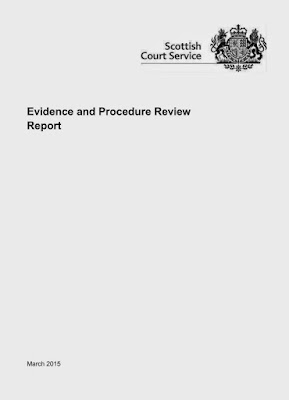 Scotland’s courts are faster – claim the Courts. NOTORIOUSLY slow for the past 400 years - as any solicitor, crook, client & litigant can testify – delays in court – from the Court of Session to Sheriff courts and the broom cupboards of Justices of the Peace - are commonplace.
Scotland’s courts are faster – claim the Courts. NOTORIOUSLY slow for the past 400 years - as any solicitor, crook, client & litigant can testify – delays in court – from the Court of Session to Sheriff courts and the broom cupboards of Justices of the Peace - are commonplace.
However, Scotland’s courts have now managed to reduce waiting time for criminal trials – so say the people who ‘run’ the courts.
The ‘proof’ - offered up in a report compiled by - the Scottish Courts and Tribunals Service (SCTS) - claims almost all trials in sheriff courts in 2016 began within 16 weeks, whereas two years earlier the ‘official’ figure was half.
The SCTS claim this was despite a significant increase in mostly criminal cases, particularly relating to domestic abuse and sexual violence.
However, the report – widely seen as more Public Relations than fact – fails to take account of rising numbers of cancelled or abandoned prosecutions of criminals and secretive plea deals by Crown Office prosecutors which have the effect of speeding up trials awaiting court time.
 Compiled at taxpayers expense, the SCTS report goes on to claim the closure of 17 courts - 10 sheriff and seven Justice of the Peace courts - had been successfully implemented, with savings already realised of £2.1m and further annual savings expected of £1.3m.
Compiled at taxpayers expense, the SCTS report goes on to claim the closure of 17 courts - 10 sheriff and seven Justice of the Peace courts - had been successfully implemented, with savings already realised of £2.1m and further annual savings expected of £1.3m.
SCTS said while concerns were expressed that court performance would suffer as a result of the transfer of business from smaller centres, there has been "strong and improved performance".
New Court Structure Allows Targeted Investment
Three years on from the report which described a future court structure for Scotland, an evaluation report confirms the vision set out in ‘Shaping Scotland’s Court Services’ is fully on track. To date:
The closure of 10 sheriff courts and 7 justice of the peace courts has been successfully implemented;
The business redistributed following those closures is handled within normal performance targets at the receiving courts;
The expected level of financial savings from the changes are being realised,
The SCTS has been able to target funding more productively on the maintenance and development of its retained estate; and
The longer term vision for an efficient court structure is largely in place and the remaining elements continue to progress in parallel with the deployment of the new summary sheriff posts.
While there were concerns expressed that court performance would suffer, the evaluation data clearly demonstrates strong and improved performance. In all courts, the 16 week waiting period between the first calling availability of a criminal trial is being achieved, indeed, in some courts we have re-adjusted the programme as the waiting period was becoming short, with the risk of not allowing sufficient time for crown and defence preparation. Similarly, all courts are meeting, and in most cases significantly below, the 12 week waiting period for civil proofs and hearings.
This level of performance continues to be achieved against the background of a significant increase in case levels in both summary and solemn business, particularly in relation to domestic abuse and sexual offences, with a far greater proportion of these cases proceeding to evidence-led trials.
In April 2014 the percentage of sheriff courts setting criminal trials at the optimum 16 weeks was 50%, at April 2016 this figure is 95%.
Referring to the evaluation report, SCTS Chief Executive Eric McQueen said: “The SCTS Board’s ten year vision is to create a stronger court service which improves access to justice, reduces delay and costs, and maximises the use of digital technology to improve our services. We are now delivering on that, the evaluation report confirms that annual recurring savings of £1.3 million will be achieved, allowing us to target investment to create a modern court structure throughout Scotland, with digital innovation at its heart.
Last year we installed new ICT infrastructure that provides the speed and resilience we require for digital evidence presentation, video links, case management systems and Wi-Fi access across our courts. This technology supports digital access, particularly for vulnerable witnesses and our prison to court facilities which reduces personal appearances by the accused.
With the introduction of the new civil simple procedure later this year, we are planning to make online processing available for most payment actions up to £5000. This includes an online portal to enable the legal profession and the public to commence actions, submit case documents, pay fees and track progress online. We will extend this to all areas of simple procedure by mid-2017, allowing over 60% of all civil business in the sheriff courts to be processed online.
Our priority now is to develop the recommendations in our “Evidence and Procedure Review – Next Steps” report. For too long it has been easy to describe our criminal courts as products of the Victorian age. Our task now is to bring them right into the 21st Century, not by tinkering at the edges, but by radical digital reform to improve the quality of justice for all concerned. Through technology we can allow children and vulnerable witnesses to give their evidence, and have it examined, outwith the trauma and pressures of the court environment and modernise the way we do business in summary criminal cases through a digital case management system.”
Feeling any faster in court – tell us about it! – Ed



